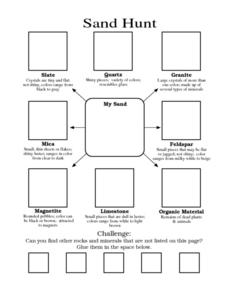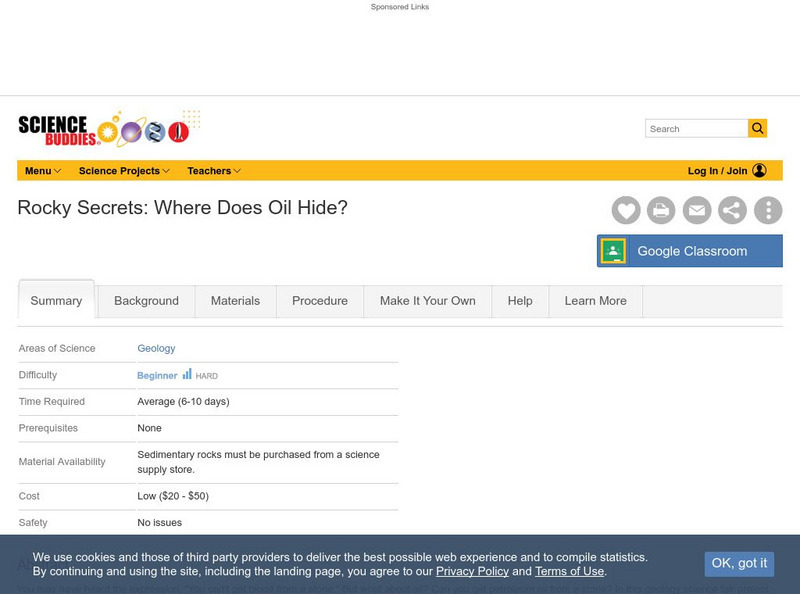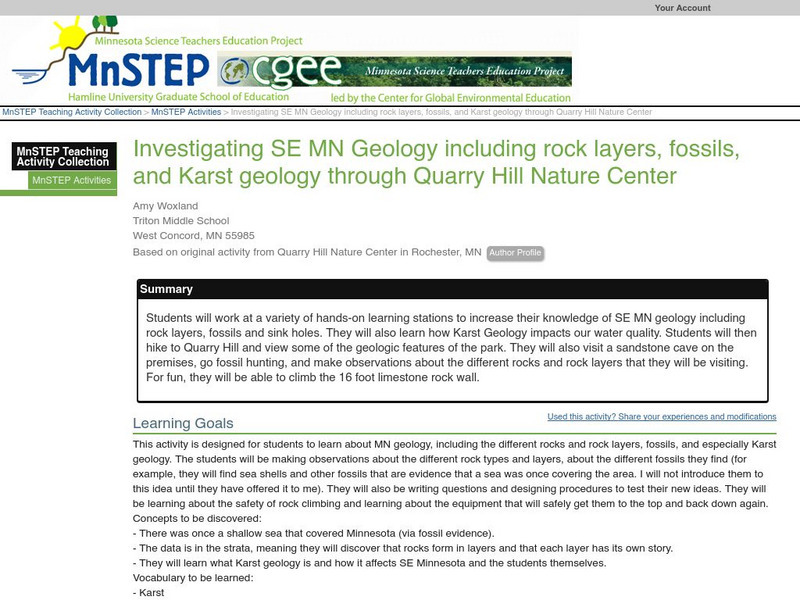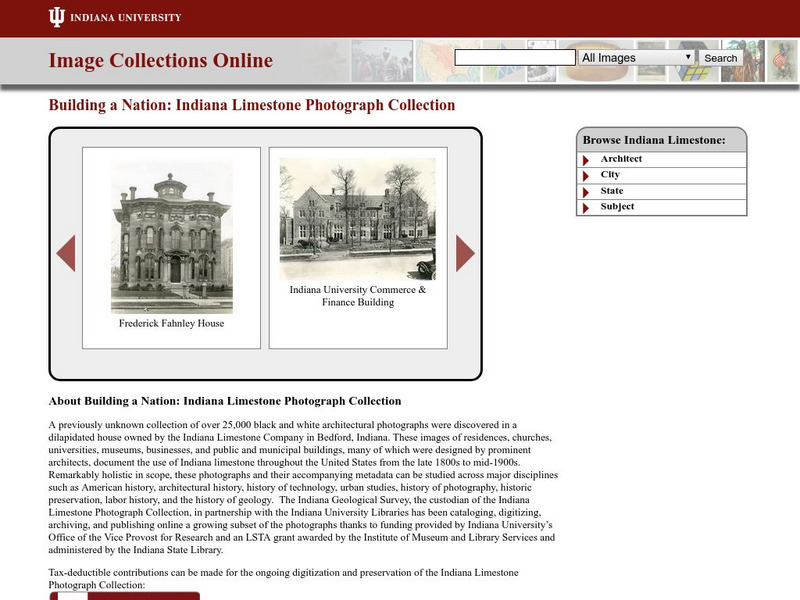Curated OER
Chemical Weathering
Eighth graders comprehend the effects of chemical and mechanical weathering. They comprehend the differences between the two forms of weathering and the various agents involved in both forms of weathering. Students complete a...
Curated OER
CREATE A CAVE
Students investigate the concept of caves by conducting an experiment. The lesson contains background information for the teacher. They collect data while making observations and write a review of the concept once the experiment is...
Curated OER
Edible Rock Layers
Students use edible food items to conduct an experiment that simulates the movement, folding, and faulting of rock strata like sandstone, siltstone, limestone, and shale. Students then get to eat the experiment when completed.
Curated OER
Making Sedimentary Rocks
Students make models of sedimentary rock layers to explain how rocks form layers and represent ancient environments. Layers of sediment and fossils are added together to simulate the environment and connections to sedimentary rocks are...
Curated OER
It's Sedimentary, My Dear!
Students examine sedimentary rocks to determine how they form. In this Earth science lesson plan, students will make a rock by cementing small particles together. The students will then compare their observations of sedimentary rocks to...
Curated OER
Sand Hunt
In this earth science worksheet, middle schoolers identify and locate various rocks and minerals listed on the sheet. Then they describe each one in the boxes given.
Curated OER
Cavern Geology: Speleothem Construction
Students discover how underground rock formations grow. They perform various activities based on grade level.
PBS
Pbs Learning Media: Cave Formation: Biogeochemical Cycles
This video segment adapted from NOVA chronicles the discoveries that led to a radical new theory in which living organisms, not just geological processes, play an active role in cave formation. [5:42]
University of California
Ucmp: The Paleozoic Era
An excellent overview of the Paleozoic Era. It also provides a chart where you can learn information regarding each of the time frames within the era.
Science Buddies
Science Buddies: Rocky Secrets: Where Does Oil Hide?
You may have heard the expression, "You can't get blood from a stone." But what about oil? Can you get petroleum oil from a stone? In this geology science fair project, you'll find out what kinds of stones make the best storage rocks for...
Science Education Resource Center at Carleton College
Serc: Investigating Se Mn Geology Incl Rock Layers, Fossils, and Karst Geology
Students will work at a variety of hands-on learning stations to increase their knowledge of SE MN geology including rock layers, fossils and sink holes. They will also learn how Karst Geology impacts our water quality. Students will...
Encyclopedia of Earth
Encyclopedia of Earth: Geology: Limestone
Article explaining what limestone is, how it is formed, where it occurs, the different types, and how it has been used throughout history. (Published: August 8, 2010)
Other
Nsu: Caves of South Dakota
South Dakota is home to hundreds of limestone caves. This site discusses how limestone caves are formed, where they are located, and why they are useful.
Children's Museum
Children's Museum of Indianapolis: Floating Rock Geo Mysteries
Did you know that there are some rocks that actually float? Follow this interactive investigation to find out which ones and why.
Georgia Department of Education
Ga Virtual Learning: Earth and Life History
In this amazingly comprehensive tutorial you will learn about the geological and environmental changes that occurred during the geologic time scale.
University of Kentucky
University of Kentucky: Rocks and Minerals: Sedimentary Rocks
An excellent resource for learning about sedimentary rocks and how they form. The different types of sedimentary rocks and deposits found in Kentucky are listed, with links to dedicated pages for each. Covers clay, shale, sandstone,...
Other
Geology.com: Rocks: Pictures of Sedimentary Rocks
Presents photographs of examples of clastic, chemical, and organic sedimentary rocks, with short descriptions underneath each rock image. Each rock name is also linked to its own dedicated page with a great deal of additional information...
University of Oregon
Museum of Natural and Cultural History: Rocks and Minerals: Everyday Uses
Click on the shelves in this virtual exhibition to learn about the many rocks and minerals that we use in our everyday lives.
Indiana University
Indiana University: Building a Nation: Indiana Limestone Photograph Collection
A collection of over 25,000 black and white architectural photographs that were discovered in a dilapidated house owned by the Indiana Limestone Company in Bedford, Indiana. These images of residences, churches, universities, museums,...
Other
Caterpillar: Ground Rules: Mining Right for a Sustainable Future [Pdf]
This set of lesson plans was developed to accompany Ground Rules: Mining Right for a Sustainable Future, a documentary film created by Caterpillar and Science North. They introduce students to the various phases involved in mining,...
American Museum of Natural History
American Museum of Natural History: O Logy: If Rocks Could Talk: Limestone
A simple explanation of how limestone rock is formed.
Science Education Resource Center at Carleton College
Serc: Investigating Karst Topography and Connection to Se Minnesota Sinkholes
In this field investigation, students will be able to observe, record, compare/contrast a variety of sinkholes located in the southeastern Minnesota area, including a significant one at the Harmony Karst Interpretive Site. The students...
Geographypods
Geographypods: Sinkholes Deep Deep Down
After learning about sinkhole formation, students will create a project by designing and making a 3D model of a sinkhole using a box of tissues.
Other
Women in Mining: Toothpaste With a Twist [Pdf]
In this activity, students work in groups to create their own toothpaste in order to learn about the rocks and minerals it contains. Includes discussion questions and extension activities.






















![Women in Mining: Toothpaste With a Twist [Pdf] Activity Women in Mining: Toothpaste With a Twist [Pdf] Activity](http://content.lessonplanet.com/resources/thumbnails/410013/large/bwluav9tywdpy2symdiwmduymc0ymdu4ms0xnhlid28uanbn.jpg?1589984701)